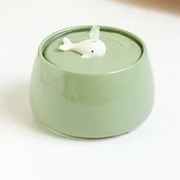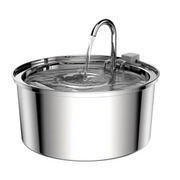Can Cats Eat Ham? Unraveling the Facts and Myths
Cat Water Fountains Australia
Share This Article
| Summary: Yes, cats can eat ham in small amounts as an occasional treat. However, it should not be a regular part of their diet. Ham is high in sodium and fat, which can be harmful to cats in large quantities. Additionally, some hams may contain added seasonings or preservatives that could be toxic to felines. |
As cat owners, we often find ourselves tempted to share our favourite foods with our feline friends. Ham is a popular choice for many humans, and it's natural to wonder if it's safe to give a tasty morsel of ham to our beloved cats. In this comprehensive guide, we'll explore whether cats can eat ham and the potential risks and benefits associated with this meaty treat.
Cat Hair Remover Roller
Buy Now
Understanding Feline Dietary Needs
Before we delve into the specifics of ham, it's crucial to reiterate that cats are obligate carnivores. Their natural diet in the wild consists mainly of meat, and their digestive systems are designed to extract essential nutrients from animal-based proteins. As such, a cat's diet should primarily revolve around high-quality, meat-based cat food to meet their specific nutritional requirements.Ham and Cats: The Verdict
While cats can technically eat ham, it's not an ideal addition to their diet. Ham is processed meat that often contains additives, preservatives, and high levels of salt. Cats are sensitive to sodium, and excessive salt intake can lead to dehydration, kidney issues, and other health problems.Additionally, ham is high in fat, which can cause digestive upset in cats and potentially lead to more severe conditions like pancreatitis. The richness of ham can be too much for a cat's delicate digestive system to handle, especially if they're not used to eating fatty foods.
Health Risks of Feeding Ham to Cats
Feeding ham to your cat can pose several health risks, including:Sodium Intoxication: As mentioned earlier, the high sodium content in ham can overwhelm a cat's kidneys, leading to dehydration and potential sodium poisoning.
Digestive Upset: Cats may experience stomach discomfort, vomiting, or diarrhea after consuming ham, as their bodies are not adapted to handle large amounts of fatty and processed foods.
Pancreatitis: The high fat content in ham can trigger inflammation of the pancreas in cats, a painful and potentially life-threatening condition.
Obesity and Weight Issues: Regular consumption of ham can contribute to weight gain in cats, leading to obesity and associated health problems.
Alternatives to Ham
If you're looking to treat your cat to something special, there are safer alternatives to ham that they'll enjoy just as much:Cooked Plain Meat: Offer your cat small amounts of cooked, unseasoned chicken, turkey, or beef. These lean meats provide a closer approximation to their natural diet and are generally well-tolerated.
Freeze-Dried Meat Treats: Many pet stores offer freeze-dried meat treats specifically designed for cats. These treats retain the nutritional value of fresh meat without the harmful additives found in processed meats like ham.
Cat-Safe Fruits and Vegetables: Some cats enjoy small amounts of cat-safe fruits and vegetables, such as blueberries, pumpkin, or cooked carrots. Always ensure that the fruits and vegetables are safe for feline consumption and introduce them gradually.
Final Thoughts
While cats can technically eat ham, it is not recommended as a regular treat or part of their diet. The high sodium, fat, and preservative content in ham can pose significant health risks to our feline companions, including sodium intoxication, digestive issues, pancreatitis, and obesity.
As responsible pet owners, we must prioritise our cats' well-being and provide them with a balanced, meat-based diet that meets their specific dietary needs. If you want to treat your cat to something special, opt for safer alternatives like cooked plain meat or freeze-dried meat treats, and always consult your veterinarian if you have any concerns about your cat's diet or health.
Remember, a happy and healthy cat is a cherished companion, and making informed choices about their diet is essential to ensure their well-being and longevity.
Note: This article is intended for informational purposes only and should not be considered as veterinary advice. If you have specific concerns or questions about your cat's diet, it is recommended to consult with a qualified veterinarian.









